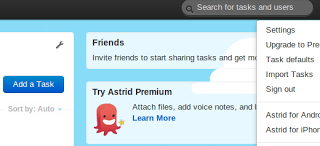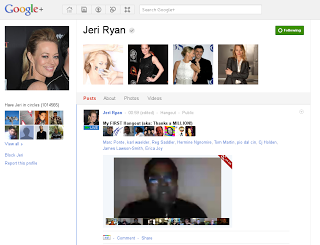.. and why you should consider it, or, “…and how to be more efficient”.
I’m an avid tasker and a fan of the GTD methodology, but when I use tools that have lots (and lots!) of features I tend to slip up easily and do silly things. An example is adding a repeating task to my task list. A repeating task? Why is this an issue?
 |
| Google Tasks: Simple. Too simple, for some. |
I simplify this slightly, but in David Allen’s approach to task management, anything that is time-related should be put into a calendar. Therefore, if I am allowed to set up a repeating task, this means I need to do something with a certain regularity, which further implies I must actually do it at some point in order for it to warrant the repetition which I have ascribed to it.
In ToodleDo and other “expert” task managers, the ability to manage tasks has advanced to the point where you can essentially control your calendar through your task manager. This approach really suits some people but, to me, this essentially is the tasks-first, time-second approach. It is truly a GTD-esque system and I have had a love/dislike affair with it for several years. I have never “hated” ToodleDo – it’s a great system, but isn’t as integral with my working environment as I would like.
Why move?
To me, tasks should be lean and mean. I don’t really want to spend my time managing them – I want to be doing them. And various factors always weigh in that can be managed outside of my task list. I become less efficient if I start duplicating events into tasks.Part of me loathes the traditional “Weekly Review” of the GTD system. I have a daily review and the most important things are always the ones that get done – it’s a self-managing approach which I’m happy with and doesn’t require over-thinking. Removing the opportunity to over-manage tasks is A Good ThingTM in my book. All I want to do is store my tasks somewhere and interact with them quickly. Using Tasks in Google will accomplish this.
Yes, but what about contexts, projects (folders), statuses & goals?!
 |
| GTDers rejoice! Toodle- Do lets you live the dream! |
- Context
In GTD, the context of a task is, broadly, how, when or where you might do it. What I kept finding about my contexts, as I was setting them, were that they kept resembling more basic primary situations. For example, I started with “shopping”, “online”, “errands”, “home”, “phone” and “work”. Except, when I started looking more closely, these contexts could be whittled down – and needed to be, in order not to conflict with my Projects/Folders.”Errands” and “shopping”.. well, I would generally be out and about for both of these, so why not make them simply “out-and-about”? This would mitigate the risk of not running an errand while out shopping. Phone calls would typically be work-related, but not always – so I would either make them during work or in personal time. Realising this, I started to see that all of my activities would be split, broadly, between work and personal time. Therefore, if I was working, I would want to make work phone calls. At home, I would want to catch up with my friends online.With always-connected capability (phone, internet, 3G, etc) my contexts eventually became two things: work or personal. That’s it. With a Google Apps for Business account (work) and a personal GMail account (personal), I can separate my work and personal tasks completely. - Projects/Folders
My Folders (“Projects” in GTD parlance) in ToodleDo would typically resemble the types of task I needed to manage. You could argue that this is the wrong way to manage tasks, and instead use Tags for this purpose. While true, Tags are amorphous while Folders are structured and, in ToodleDo, Folders resemble the only way to aggregate tasks into suitably-managed “blocks”.My Folders are things like “cases” (support), “customer/project”, “finance”, “phonecalls” and “systems”. These are unlikely to change as they closely match my general daily activities. Google’s Tasks can accommodate this with top-level lists. Within each list, I can have a task (with indented sub-tasks) which allows enough manageability without overcrowding my senses with due-dates, contexts and estimated duration. - Status
This is a real easy one and probably the one thing I disagree with GTD about. The overall status of my tasks is logical: either incomplete, or complete. If I am waiting on somebody, I will already know this. If I am doing my task, I will probably know this too!But what about if I wish to do my task “someday“? Well, shocking as it may sound, but that’s how I view all my tasks. They are things to be done, sooner rather than later, but someday is the best I can plan for. And this is what it’s all about: planning effectively. Therefore, to have a status of “planning” seems idiotic: unless I’m actually doing a thing, I’ll probably planning to do a thing!This is the key: the status of a task in GTD could be mistaken for the status of a person – you. If my status changes, that might mean my ability to do that task is deferred. That doesn’t mean I won’t do it, or that the task somehow becomes like me and is also unable to do anything until another time (such as when I am well, or back from a holiday, etc). - Goals
…. I include here as a passing reference. One aspect of goal-setting is the ability in ToodleDo to track progress on tasks relative to goals set. In this regard, Google’s Tasks is clearly inferior. But managing goals can exist outside the context of a task management application and, I argue, it should. If goals are important, one’s whole life should be managed into achieving them.
They said it couldn’t be done.
Well, actually, they didn’t really say that. I did. But it’s true – it couldn’t be done, easily, until now.

Here’s what you need:
- A ToodleDo account (www.toodledo.com)
- An Astrid account (www.astrid.com)
- A GMail or Google Apps for Business account (www.gmail.com)
- A smartphone capable of running Astrid’s mobile app, installed from your device’s play/app store.*
* I have only used this on Android 4.1 and have set up both of my Google accounts as sync accounts on my phone. As always, your mileage may vary.
- Install the Astrid app on your smartphone.
- In the app, navigate to Settings (see pic to the right)
- Select Sync & backup
- Click on Synchronize now
- Authorize the log-in using your destination Google account
- Create or Log-in to your astrid account using your desktop web browser, as astrid.com
- Still in the Astrid app on your phone, go back to the Sync & backup settings and select Astrid.com – ensure that you can log in using your astrid.com account credentials.
- Run a sync on the phone (menu > Sync Now) – this will sync your two task lists (Astrid and Google).
- Now, log in to ToodleDo in your desktop browser and navigate to Tools > Import / Export / Backup and select CSV Import / Export. Choose to Export all incomplete tasks. You can also export all completed tasks if you want, but there’s no point syncing them (IMHO).
- Back at Astrid.com in your desktop browser, click on your “name menu” at the top-right of the page, then Import Tasks. (see above-right screenshot)
- In the next page, use the drop-down to select ToodleDo.
- Import your CSV backup of incomplete tasks from ToodleDo – this may take a couple of minutes. Be patient! NOTE: I saw a javascript error/alert when doing this, but my tasks still imported ok.
- Back on the phone, tap “Sync now” again.
- Voila! Your original tasks are now in Google Tasks!







